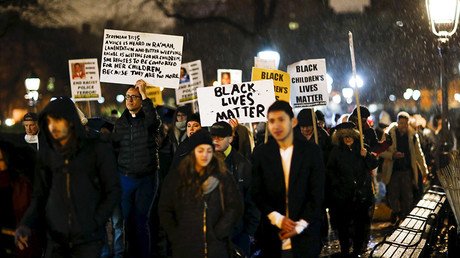Trump to undo Obama’s ban on arming police with ‘surplus’ military gear – media
US President Donald Trump is reportedly preparing to undo Barack Obama’s order and lift a ban on arming local US police with war-fighting equipment, including grenade launchers and heavy armored vehicles.
The ban was imposed in 2015 following violent unrest in Ferguson, Missouri.
Documents seen by USA Today and the Associated Press (AP) say Trump is planning to reverse Barack Obama’s executive order banning local police agencies from receiving militarized gear and equipment.
It included grenade launchers, bayonets, tracked armored vehicles, weaponized aircraft and vehicles, as well as heavy firearms and ammunition of .50-caliber or greater.
The move would revive “the full scope of a longstanding program for recycling surplus, lifesaving gear from the Department of Defense, along with restoring the full scope of grants used to purchase this type of equipment from other sources,” reads an administration document reportedly delivered to some law enforcement agencies.
“Assets that would otherwise be scrapped can be re-purposed to help state, local and tribal law enforcement better protect public safety and reduce crime,” it adds.
Obama’s directive that he signed back in 2015 covered military-style equipment from being re-purposed from army arsenals to America's local police departments.
The deployment of such equipment, Obama maintained at the time, would make the police look like an “occupying force,” creating mistrust and frustration towards law enforcement officers.
“We've seen how militarized gear can sometimes give people a feeling like they're an occupying force, as opposed to a force that's part of the community that's protecting them and serving them,” Obama said after announcing the ban in 2015.
Obama’s ban came on the back of public outrage sparked by police conduct during the 2014 unrest in Ferguson, where heavily-armed officers confronted protesters for days following the shooting of an unarmed 18-year-old black man by a white policeman.
At some point, armored personnel carriers marked SWAT appeared in the area, with officers in green military-style uniforms pointing their rifles at men and women who scattered into side streets.
The documents indicate Trump's order would prioritize public safety over the appearance of intimidating, military-type equipment. The files reportedly describe much of the gear as “defensive in nature” meant to protect officers while on duty.
Advocates of the Trump’s initiative also argue police departments are in acute need of protective gear and more potent weapons allowing them to respond to high-risk calls, including shooting sprees and terrorist attacks.
READ MORE: Battlefield USA: American police ‘excessively militarized' - ACLU study
However, critics denounce it as creating even more cracks between wary ethnic communities and the authorities. National Association for the Advancement of Colored People (NAACP) said on Sunday that it is “exceptionally dangerous and irresponsible” for the administration to lift the ban, according to AP.
“Just a few summers ago, our nation watched as Ferguson raised the specter of increased police militarization. The law enforcement response there and in too many places across the country demonstrated how perilous, especially for Black and Brown communities, a militarized police force can be,” the group said.
Trump’s initiative is likely to escalate racial tensions “in the wake of the tragedy in Charlottesville and against a backdrop of frayed relations between police and communities of color,” it added.












